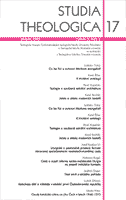"Žvást na žvást?" Interpretace Iz 28,10.13 v kontextu knihy proroka Izaiáše
şāw lāşāw?: Interpretation of Isa 28:10.13 in the Context of the Book of the Prophet Isaiah
Author(s): Gabriela Ivana VlkováSubject(s): Christian Theology and Religion
Published by: Univerzita Palackého v Olomouci
Keywords: Gibberish; Incomprehensibility; Foreigners; Irony; Isaiah; Old Testament; Exegesis
Summary/Abstract: This article offers an interpretation of difficult words caw läcäw qaw läqäw in Isa 28,10.13. Rendering the words as a gibberish utterance of drunken priests and prophets or as a children’s babbling is to be refused. It seems better to interpret the words as an imitation of some incomprehensible speech of foreigners in Jerusalem. In Isa 28,13, the prophet surely imitates the language of Assyrian conquerors, whose advance presents God’s sarcastic response to His people for the lack of the trust in the time of Sennacherib’s invasion. As for Isa 28,10, there are two possibilities of interpretation. The utterance could have the same meaning as it has later in Isa 28,13. But it is also possible to consider the unintelligible pronouncement in Isa 28,10 as a parroting of Ethiopian envoys (cf. Isa 18,2.7), who came to Jerusalem in attempt to obtain support for the anti-Assyrian coalition, which was resolutely criticized by Isaiah. In this case, Isa 28,10–13 would be regarded as an excellent example of Isaiah’s art of irony.
Journal: Studia theologica
- Issue Year: VI/2004
- Issue No: 3
- Page Range: 1-13
- Page Count: 13
- Language: Czech

